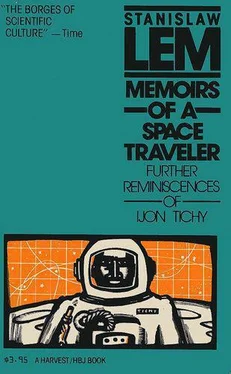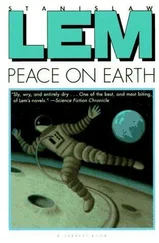“Excellent,” he said, now altogether professorial, and eyed me with new interest, as if discovering in me a quality for which I deserved some small respect. “But besides that he developed a method of synthesizing large molecules, artificial protein solutions that were living, you see. They were a kind of gluey jelly. He doted on them. Gave them their daily bread, so to speak. Sprinkled sugar, carbohydrates on them, and those jellies, those shapeless proto-amebas swallowed everything so nicely and kept on growing. First in small Petri dishes… he transferred them to larger containers, fussed over them… his lab was full of them. Some died on him and decomposed, from the lousy diet, I assume. The man went off the deep end after that, kept racing around with that beard of his, which he was always accidentally dipping into his beloved glue, but he made no more progress. He was too stupid, he needed something more — up here.” Zazul put his finger to his head. Its bald spot gleamed under the low-hanging lamp like a piece of yellowish ivory. “And then I got to work, Tichy. I won’t go into the details; it’s very specialized, and those who could truly understand the greatness of my achievement have not yet been born. In short, I created a protein macromolecule that can be set on a definite course of development, as an alarm clock can be set… No, that’s a poor analogy. You know about monozygotic twins, of course?”
“Yes, but what does that have to do with it — “
“You’ll see in a moment. The fertilized egg divides into two identical halves that yield two perfectly identical individuals, two neonates, two mirror-image twins. Imagine, now, that there is a way to create, by studying thoroughly the organism of a mature, living person, the egg from which he was born. One could therefore produce the twin of this person, although with many years’ delay. Do you follow?”
“Why,” I said, “even if that were possible, you would obtain only half the egg — only one gamete — and it would immediately die.”
“Maybe for some people, not for me,” he replied haughtily. “I take this artificially created gamete, set it on a definite course of development, place it in a nutritive solution and that in an incubator, like a mechanical womb. I transform it into a fetus at a rate a hundred times faster than normal fetal development. In three weeks the embryo is a child; in a year, after the application of other procedures, the child has a biological age often; in four more years he is a man of forty. And that is exactly what I did, Tichy.”
“The homunculus!” I cried. “The dream of the medieval alchemists! I understand. You claim — but even if it were so, that you created that man, do you think you had the right, therefore, to kill him? And that I’ll go along with you in the crime? You’re mistaken, badly mistaken, Zazul…”
“I am not finished,” Zazul said coldly. His head seemed to sprout directly from the misshapen mass of his hump. “First, of course, I experimented on animals. In those jars over there you have pairs of cats, rabbits, and dogs. The jars with the white labels contain the original creatures; the jars with the black labels contain the duplicates that I created. There is no difference between them. If you switched the labels, it would be impossible to tell which animal was born naturally and which came from my retort.”
“All right,” I said, “that may be true. But why did you kill him? Was he retarded? Physically underdeveloped? Even in that case you had no right…”
“You insult me!” he hissed. “He was in complete possession of his faculties, Tichy, and fully developed, equal in every particular to the original as regards the soma… but as for the mind, his potential was greater than that shown by his biological prototype. Yes, there is something more than the creation of a twin; this copy is more than a duplicate. Professor Zazul surpassed nature. Surpassed it, do you understand?”
I was silent. He rose, went to the tank, stood on tiptoe, and with a single movement pulled off the tattered curtain. I did not want to look, but my head turned in that direction and I saw, through the glass, through the cloudy alcohol, the softened, pickled face of Zazul… the large hump afloat like a bundle… the flaps of the jacket spread out like soaked black wings… the whitish gleam of the eyeballs… the matted gray of his beard. I stood thunderstruck while Zazul piped:
“You see, this was to record the achievement permanently. A human being, even one created artificially, is mortal. I wanted him to last and not return to dust, I wanted to keep him as a monument, yes. However, you must know, Tichy, a basic difference of opinion arose between us, between him and me, and as a result it was not I, no, but he who ended up in the jar. He, Professor Zazul, while I, I am in fact the…”
He giggled, but I did not hear him. I felt that I was falling into an abyss. I looked at the living face contorted with joy, then at the dead face behind the glass pane, floating like some horrible underwater monster… and I could not speak. It was quiet. The rain had almost stopped; only the faint gurgling of the spouts could be heard intermittently through the wind.
“Let me go,” I began, but did not recognize my own voice.
I closed my eyes and repeated dully:
“Let me go, Zazul. You have won the bet.”
One autumn afternoon, as it was growing dark in the streets outside and a fine gray rain fell steadily — the kind of weather that makes any memory of the sun unreal and that keeps a man glued to his seat by the fireplace — as I sat engrossed in old volumes (searching not for content — the content I knew well — but for myself from years ago), suddenly there was a rapping at my door. A violent rapping, as if my visitor, by not touching the bell, wished to announce at once that his mission was of a desperate nature. Putting aside my book, I went into the corridor and opened the door. I saw a man in a dripping oilskin; his face, twisted in great fatigue, glistened with raindrops. He did not look at me. He leaned with both his wet, reddened hands against a large chest that he had apparently carried up the flight of stairs himself.
“Sir,” I began, “what do you…” but corrected myself: “Can I help you?”
He made some vague waving gesture and continued panting; I realized then that he intended to bring his burden into my apartment but had not the strength. So I took hold of the soaked rough cords around the package and pulled it into the corridor. When I turned around, he was standing at my heels. I showed him the coatrack; he hung his coat up, put his hat (drenched to a shapeless felt rag) on the shelf, and on none-too-steady legs entered my study.
“What can I do for you?” I asked after a long pause.
It dawned on me that here was yet another of my unusual guests. Still not looking at me — absorbed, apparently, in his own thoughts — he mopped his face with a handkerchief and shivered at the touch of his wet shirt cuffs. I said that he should sit by the fireplace, but he did not respond. He seized the dripping crate and pulled, pushed, and turned it this way and that; it left a muddy track on the floor — an indication that during his journey here he must have put it down on the sidewalk once or twice to catch his breath. Only when it stood in the middle of the room and he could keep a constant eye on it did he take notice of me. He mumbled something, nodded, awkwardly went to an empty chair, and sank into its well-worn depths.
I sat opposite him. We were silent a long time, but somehow this seemed quite natural. He was not young; fifty, perhaps. His face was irregular, strikingly so, the left side smaller, as though it had fallen behind in its growth. The left corner of the mouth, the left half of the nose, and the left eyelid, all pinched, produced a permanent expression of gloomy puzzlement.
Читать дальше












